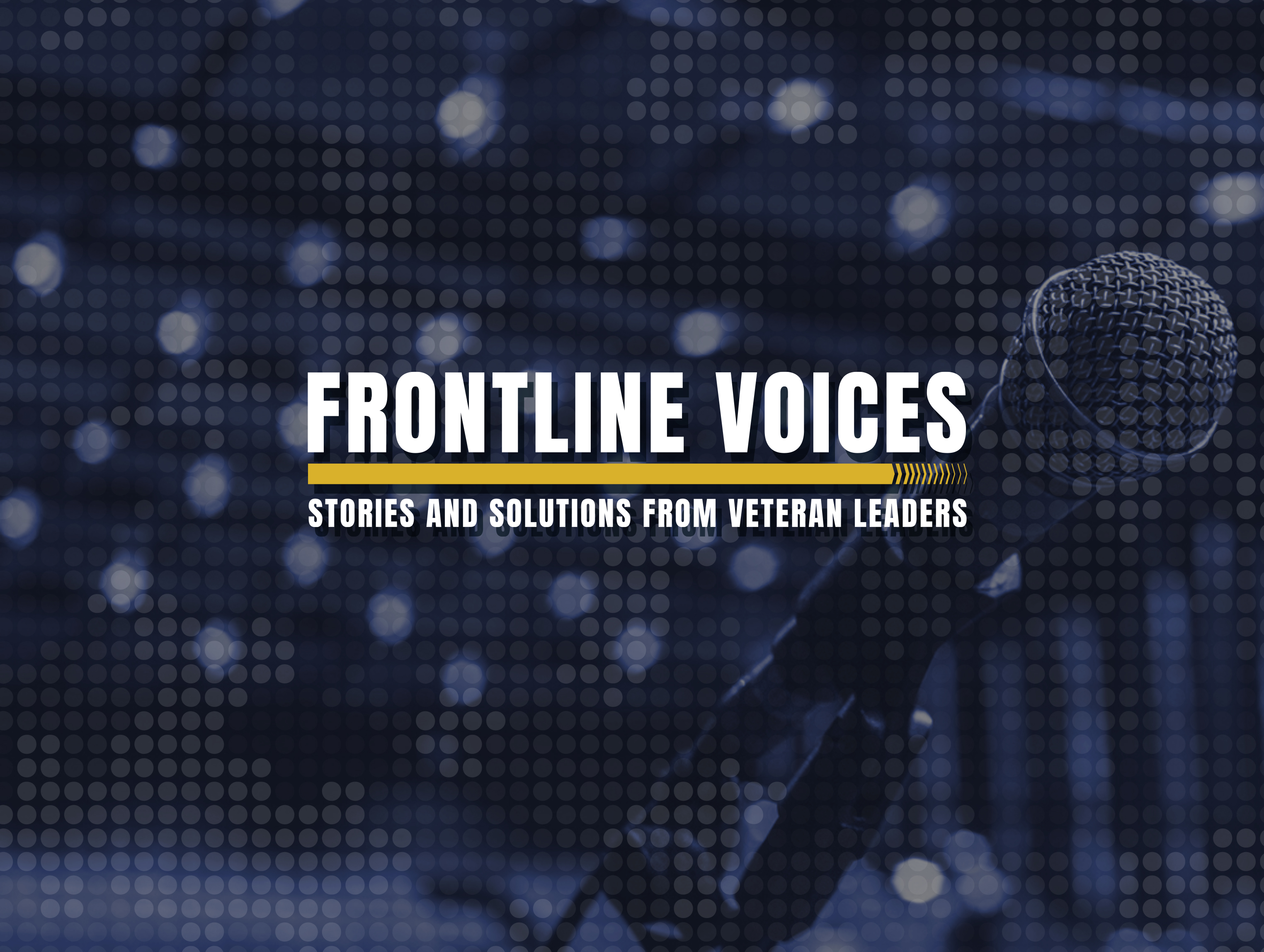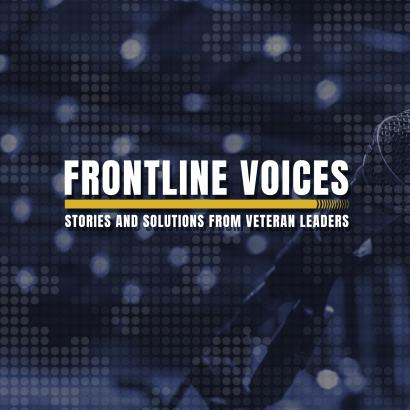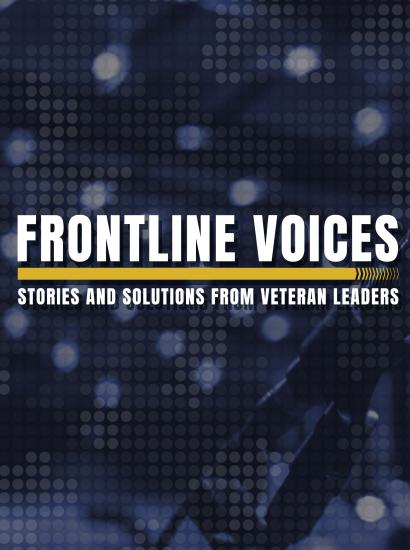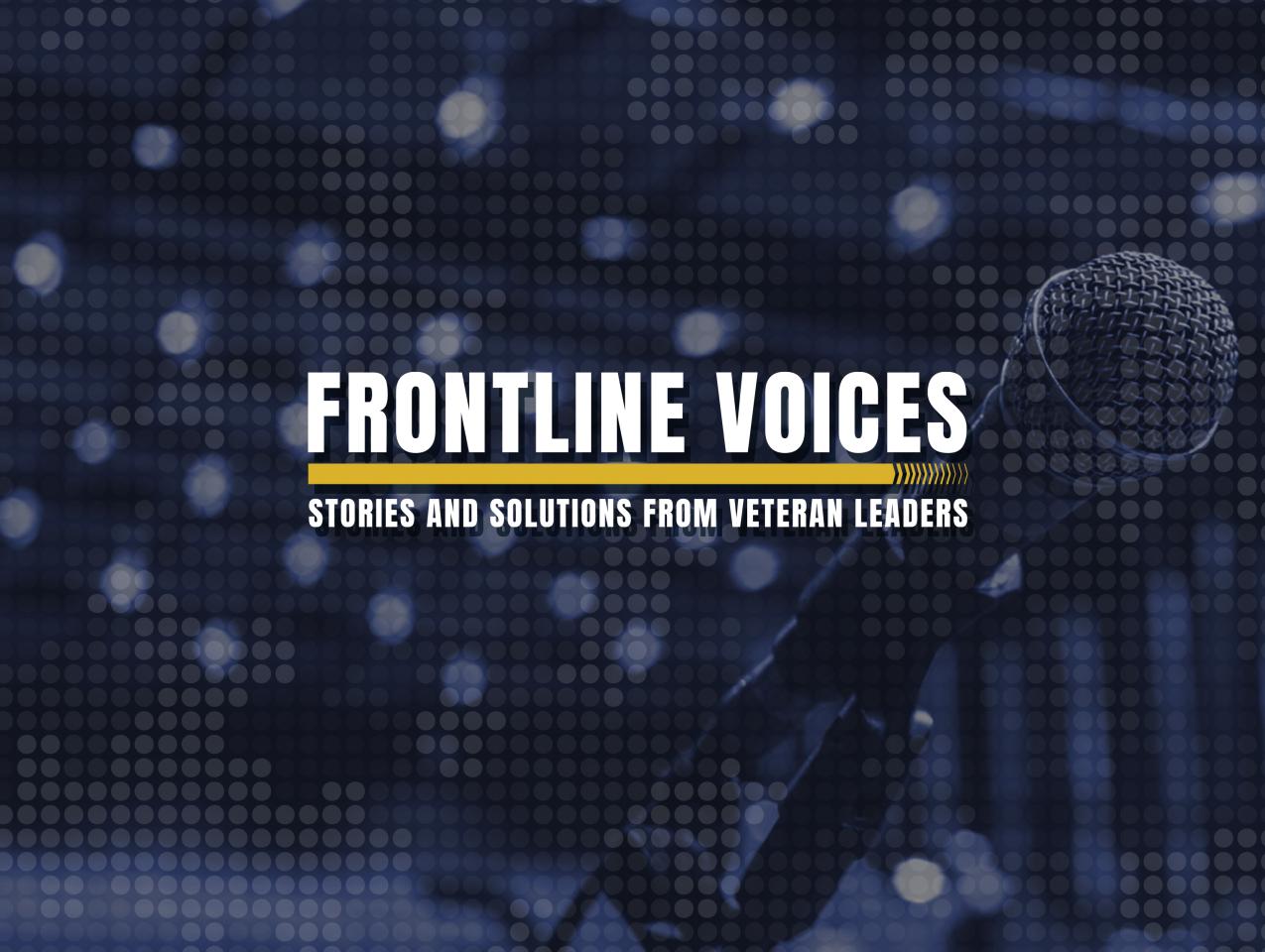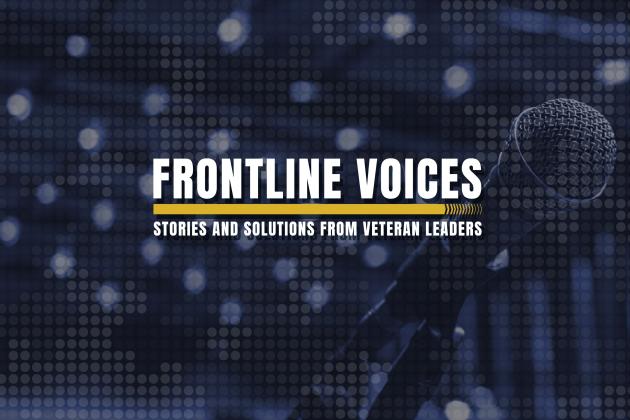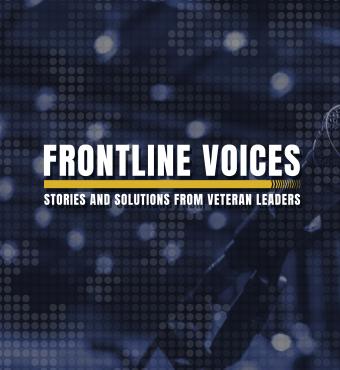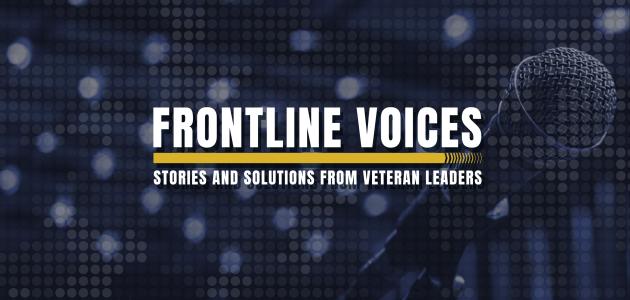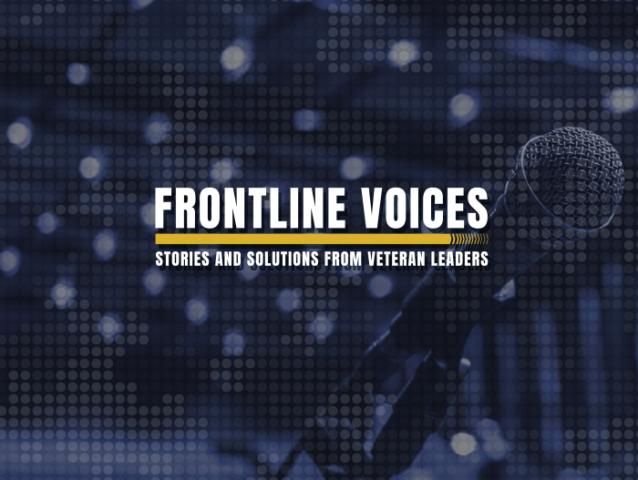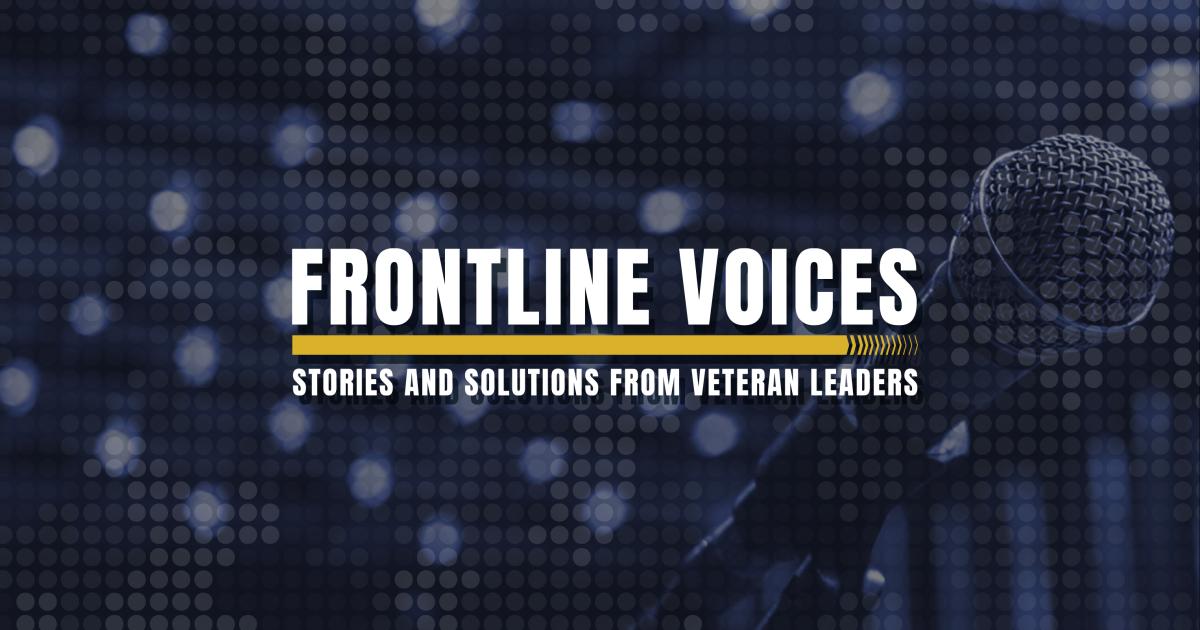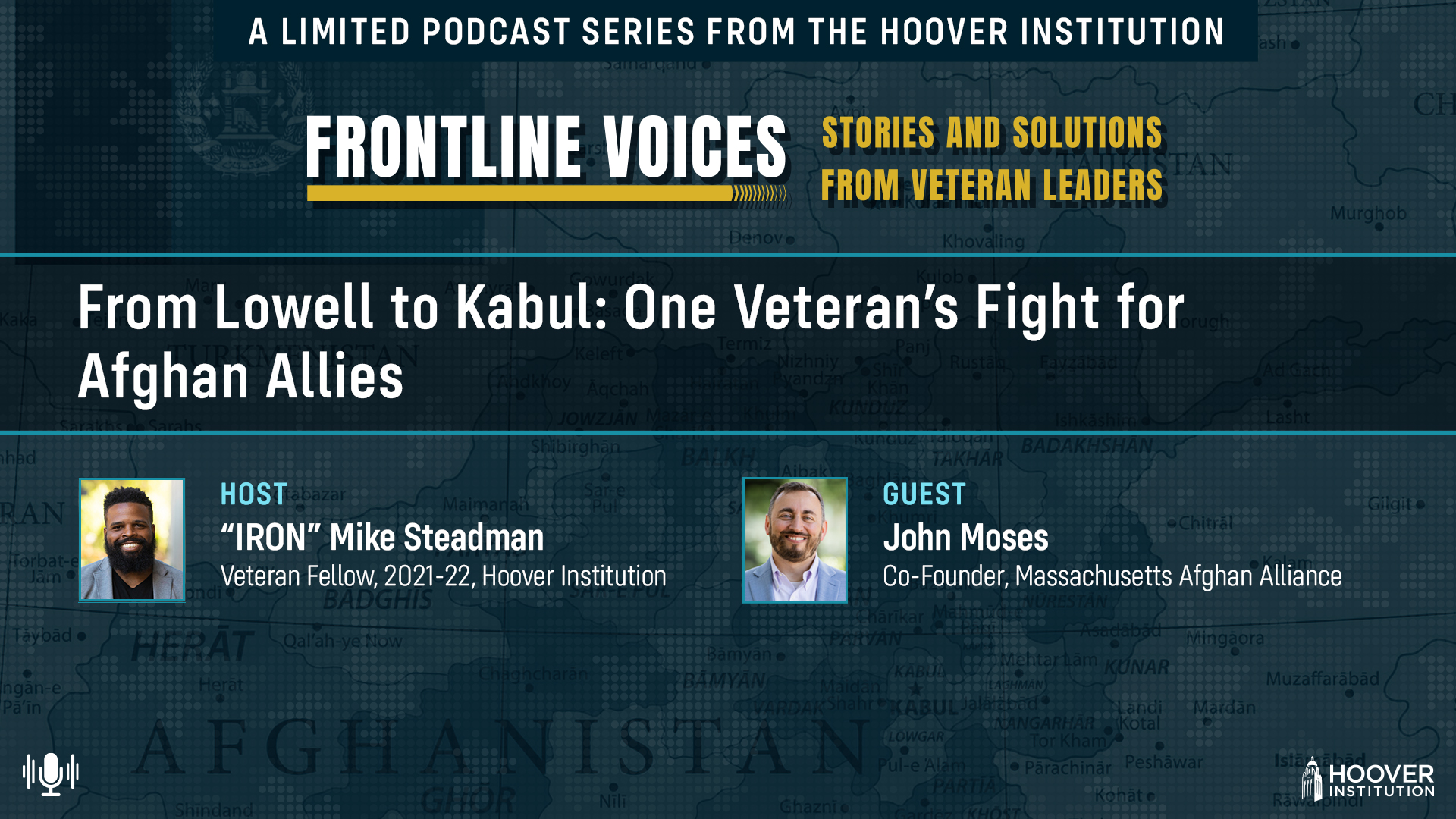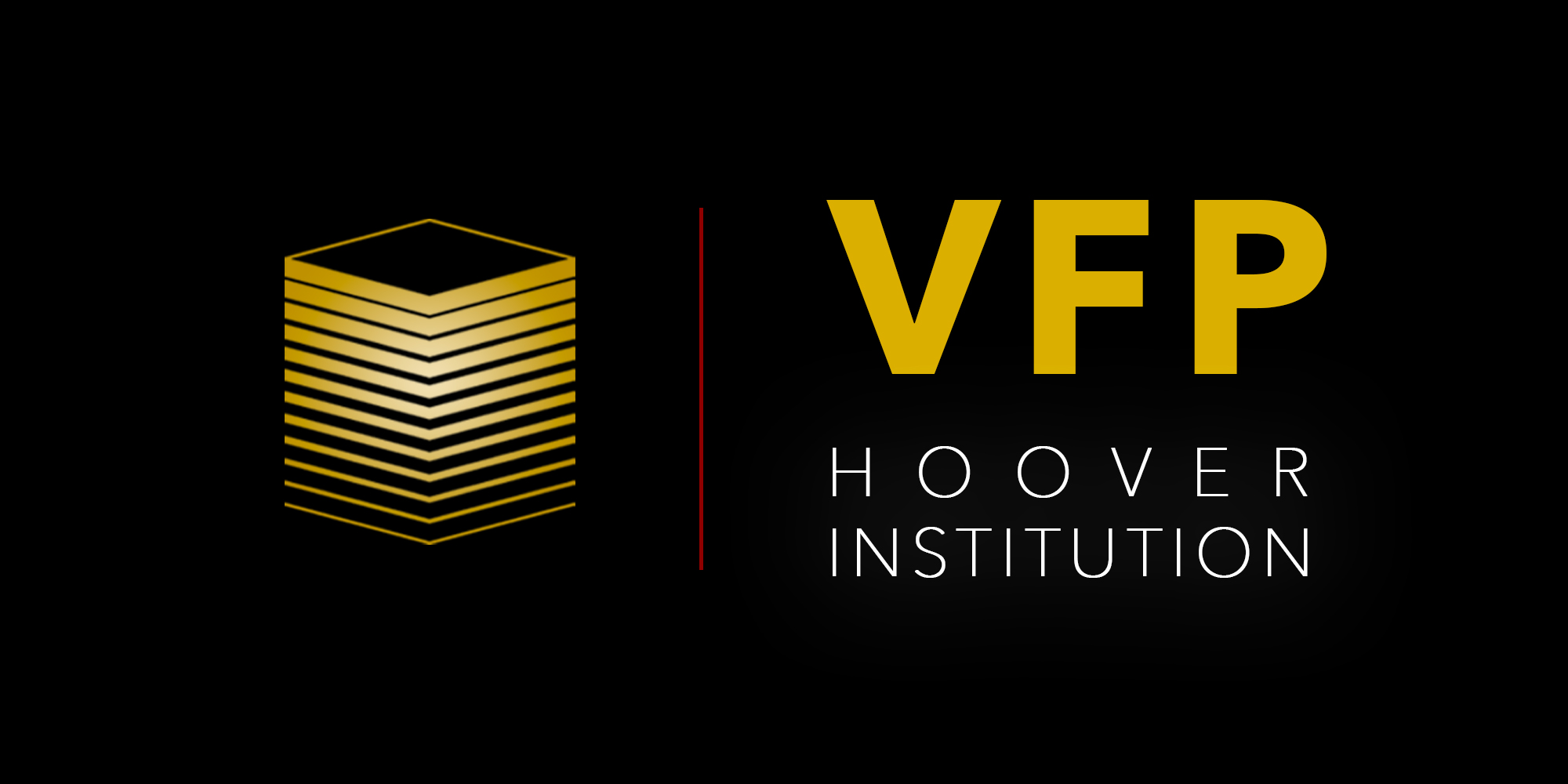- Military
- Determining America's Role in the World
- Revitalizing American Institutions
In this episode of Frontline Voices, we sit down with John Moses, retired U.S. Army Sergeant First Class, Hoover Veteran Fellow, and co-founder of the Massachusetts Afghan Alliance. John shares his journey from a blue-collar upbringing in Lowell, Massachusetts, to serving in Afghanistan, and ultimately helping evacuate 68 Afghans during the chaotic 2021 withdrawal. We talk about the moral injury veterans felt watching the collapse, the shifting U.S. sentiment toward Afghan refugees, and how John is keeping the mission alive through community support and advocacy. His story is a testament to staying above the political fray, leading with compassion, and honoring the promises we made.
WATCH THE VIDEO
>> Mike Steadman: Welcome to Frontline Voices, a podcast brought to you by Stanford University's Hoover Institution, where we explore leadership, service, and real-world solutions to some of our nation's most pressing issues. I'm your host, Iron Mike Steadman, a member of the inaugural class of Hoover Veteran Fellows and a Marine Corps veteran.
In August of 2021, as the last US forces pulled out of Afghanistan, I went through a series of mixed emotions. Including sadness, anger, and confusion about what was going to come next, specifically with regards to our Afghan allies that I fought alongside during my deployment in 2012. Initially, there was a lot of positive sentiment regarding Afghan resettlement in the US and in the immediate aftermath of the withdrawal.
But over time, that sentiment has waned and many organizations supporting it have had to deal with the repercussions. One of those is today's guest, John Moses, an Army veteran, VFP alumni, and founder of the Massachusetts Afghan Alliance, a nonprofit organization which provides a support system for Afghan allies and their families in Massachusetts.
John takes us inside his journey from his lessons learned in the uniform, the moral injuries of war, to building a great grassroots network that helped hundreds of Afghan refugees find safety and community in America. We also talk about what it means to navigate identity after service, the political and human realities of refugee resettlement, and why staying above the noise is essential when the stakes are measured in human lives.
As always, I hope you enjoyed today's show and look forward to hearing your feedback. John, my brother, what's going on?
>> John Moses: How you doing Mike? It's good to see you.
>> Mike Steadman: I know it's good to be back on Frontline Voices. I know we've had a gaps, we released an episode.
Apologize you all. You also noticed that I have glasses. I was debating with John whether I wear my glasses for this interview or not, and he told me that looked good in them. So we're gonna try something new. But John, I had a chance to spend some time with you in in Washington, D.C. for our first roll call.
It was either first or second roll call. I don't remember, but I know you were at Cohort 3 and we had a good time, just great conversation. And the stuff that you're doing is super interesting and it's very kinda timely to kinda have this conversation now because when we get there, you guys will understand what I'm talking about.
But in the interim also, I just think you have an interesting background and to see where you've come from, finding your way to the Hoover Institution as part of Veteran Fellowship program what that experience was like for you and your cast on Project. So let's start off by just having you go ahead and introduce yourself to our viewers.
>> John Moses: Absolutely John Moses Hoover veteran fellow, very proud Hoover veteran fellow and the co founder of Massachusetts Afghan Alliance. I live out in Chelmsford, Massachusetts, and I retired from the army in 2019, so retired Sergeant First Class E7. And I am absolutely honored to be on your show Mike.
>> Mike Steadman: What makes you so proud to be a veteran Fellow?
>> John Moses: I think the thing is the people we bring together, right? So the VFP brings in a lot of incredible talent and ideas and thoughts. And I like the way that VFP approached selection. It wasn't all about your recommendation letter, right?
So look, I looked at other fellowships. I was constantly trying to find them, and I'm like, I don't have a doctorate from Purdue. I don't have this. I don't have those things. And so, and a lot of veterans may not have really impressive letters from Congress people or this kinda person, right?
And so for me, when I looked at VFP, I feel like I saw opportunity. I was like, this is a program that I can use my enlisted skills, my other skills because I don't have that education piece. And I think I can do this because it's a DOER program, and I can show through my work and through my writing the things I'm able to do.
And I was so pleasantly not surprised, but it happened the way I thought it would. Those really wonderful people over the VFP really look at the projects. They wanna make sure you can accomplish it. And it put this really great foundation under me. And I'm so proud of all of the input I got from Greg or from Trill or from you, Mike even.
All this feedback where we would sit in the rooms, and it's just an incredible group of people. It's a small group, and I think we're always gonna be tight. And I'm super proud of it, I talk about it all the time. I tell everybody I'm a Hoover Veteran fellow, especially other veterans.
>> Mike Steadman: When I was growing up, I didn't even know fellowships were a thing.
>> John Moses: Me either, I didn't know. So the how I found if really quick. This is a great intro into how I learned about fellowships. During the evacuation of Afghanistan. Our little group of people here in the US that were helping Afghans get through the airport, all of them were super smart, and they were all in fellowships, right?
And I was like, what is a fellowship? I had no idea. And so at one point I just said to them, I said, well, you know what kind of fellow we are, we're the evac fellows, because we were evacuating people. And that ended up being the name of our group.
And then I learned about Hoover Fellowship and all these other great. Yeah, it's a cool program.
>> Mike Steadman: I just think exposure is so important. That's something that I think about a lot through the content that I put out, even including this podcast here, just exposing people to the opportunities that are out there.
And a big chunk of our military are enlisted men and women, but unfortunately they're not aware of all the opportunities that are available to them, including the Veteran Fellowship at the Hoover Institution. And so I think you're a great representation of the enlisted community and I would love to kinda hear a little bit about your background.
What made you enlist in the first place what your parents did and growing up and what it was like to finally make it to Stanford.
>> John Moses: Yeah, I was a really blue collar kid who grew up in a city called Lowell, Massachusetts in the 80s. It was a pretty rough city, it was well known.
I heard there was a documentary made about it. And we were from a lower middle class family living in apartments my whole life. I lived with my grandparents for the most part. It just kind of worked out that way. I wanted to stay Lowell, my dad had to go somewhere else, and my mom also had to be somewhere else.
So I was surrounded by this incredible family of my grandparents. And my mom was still there, my dad was still around, but I had this great family. And I remember my grandfather went to work every night. He used to walk to work. He was an immigrant too. He was an immigrant.
He's French, spoke French. And he walked to work every night cleaning floors at UMass Lowell. And he thought I was a really smart kid. And my grandfather would get me, acquire calculators and stuff for me, he didn't know what they were, but he thought I would think they were cool.
And so I always wanted to do something different. And like my grandfather was like, you're the next hope, right? You're so smart and all these things. And I didn't believe them and I didn't act that way in school but when it came down to it and I had to make a choice.
I was so interested in the ability to serve and how much people how people looked at soldiers, right, especially soldiers for me it was like guy walks into my cafeteria in high school with his big dress uniform on. And I was like that's a way I can get out of this the same cycle, right, I can join the military get some health care maybe, maybe get some dental care like all these things I'd never really hadn't had for a long time.
And I don't regret it and I joined and ended up doing a split up I was a reservist from the beginning. So I went between junior and senior year to basic, and then I went to my school training which I changed my job later. But that's where I kinda started and I was really inspired by wanted to do something right especially my grandfather.
He's one of my heroes.
>> Mike Steadman: And what year did you transition out?
>> John Moses: I retired in 2019, so-
>> Mike Steadman: 2019?
>> John Moses: Yeah, 1996. I was 17 when I joined the army. It was March 15th was my pantry date. 1996 and then I did, so I ended up with 23 years on the books.
I don't regret any of them. I do have-
>> Mike Steadman: Did you go to college?
>> John Moses: Not until Afghanistan, so I did not. I didn't pursue college. I never thought college would be an option. And when I was in Afghanistan, about halfway through my tour, I figured it was pretty high tempo job too.
I was like, you know what's a great idea? I'm gonna go to college and did. And then ended up graduating four years later. So I graduated at 36, yeah.
>> Mike Steadman: That's all right. First of all, I think that's super impressive. I know people say college isn't for everyone, but I do nudge, our sailors, airmen, marines, etc, right?
So at least try, don't talk yourself out of greatness, that's what I like to say. Because it is hard when people transition out of the military.
>> John Moses: Yeah. For sure, and I mean, how do you navigate those systems you've never yet navigated? As a reservist, we have an advantage to active duty soldiers.
I mean, don't mean this is pejorative. We live in the real world, right? We live out here most of the time now we have missions and all these things. But so for service it's a little bit easier. But if you come off active duty and you go into a college, I can't imagine that's the easiest process and I think they've done great work to improve it.
But I was glad I did it and I used my GI bill, I used my whole thing, all of it. I was like let's go, I earned this thing, let's dry it up.
>> Mike Steadman: And what has the majority of your career been outside of the military?
>> John Moses: So I've been in high tech.
No, I don't wanna use that term, I'll get made fun of. So I work in the tech space. I work specifically in data. High tech is kind of a catch all. So I've been working in tech startups for probably over 20 years. But I'm now a partner at my own data company called Wizardline and we do data movements for like big domino's pizza franchises move data all over the world.
But that was all earned through deployments. So earning all of my technical credentials, I did a lot of that work when I was deployed. So I would do testing in the Proctor center. Remember those?
>> Mike Steadman: Yep.
>> John Moses: Yep. So I would get my Network plus or this or that.
So whenever I was deployed, I was always working on the civilian thing, and whenever I was a civilian, I'd be working on military.
>> Mike Steadman: And so then how did you find out about the fellowship program? And what was your capstone?
>> John Moses: Yeah, so the evac fellows who I mentioned from the evacuation, one of them, Liesl, was a Hoover, so she used to work for Secretary Rice.
So she saw it and emailed it to me. She messaged it to me or whatever and was like, I think you have a really good shot at getting in on this. And so I applied, and I think it was seven days before it was due, so I had to get all the letters I was getting in.
There was no if, and, as soon as I heard about it, I started working on it. I put my resume together. I reached out to my congresswoman's office for the letters, and I did all the work, and I got it all together, and I think I submitted it the day before.
But, yeah, that's how I found out from a friend.
>> Mike Steadman: And your capstone?
>> John Moses: Yes, so my capstone. So there's a little background on this. So in August of 2021, when Afghanistan collapsed, all these Afghans, Afghan Americans, green card holders, all these hundreds of thousands of people were trying to escape the airport.
I ended up part of a team of people, the evac fellows that we would coordinate. So I was the ground coordinator, so I was responsible for moving families around. You had somebody doing paperwork and all this. But through that process, the evac fellows got 68 people through the airport, onto airplanes, and eventually to the United States.
Which it was an astonishing, it was 68 miracles is what I call it, cuz it was all really hard. But then I kinda had a skill set in it. Everybody goes their own way. And then Afghans start arriving in Massachusetts, and I'm like, okay, some arrive with $10,000, a bunch of volunteers, some arrive in hovel, right?
All the things that happen with immigrants. So I kept having this idea to improve it, improve it, improve it. And VFP came up, the veteran fellow program came up. And during my application, when they said, what's your capstone? That was the first business plan which what became Mass Afghan Alliance.
>> Mike Steadman: So you were able to launch it while being in the program?
>> John Moses: Yeah, so I launched it because of the program. It actually helped me tremendous. I'll tell you specific things that it did I can tell you about. But yeah, I launched as part of that. And then I used the feedback from all the Congresswoman Boxer and all these smart people and they would say, do this, do this.
And then I would just STFU and I would just go do that. I'd be like, all right, I'm just gonna listen to the advice. So, yeah, no, I put that. That first business plan was actually the application and then what grew to become Mass Afghan alliance, we actually got our 501(c)(3) end of 2024, and we were an LLC in 2023.
It was a good, long process, but I learned a lot.
>> Mike Steadman: Congratulations on that, man. That's epic. And we're gonna go back to 2021 too, because I was in my incubator, right? I had a little podcast studio where the Afghanistan pull out was happening, right? And now, mind you, I was in Afghanistan in 2012, right?
I did January to July 2012, right. I was infantry officer with 1st Battalion, 8th Marines, right? I had my interpreters, right? We were like this, no?
>> John Moses: No.
>> Mike Steadman: You're like this, right? Because especially like me not speaking the language, your interpreters are with you everywhere you go.
The first time I got shot at, I was with my interpreters. First time I got mortared, I was with my interpreters, so we went through a lot of stuff together on that deployment. And then you even thinking about working up to go on deployment, I used to go to 29 palms.
That's where we did our workup. Used to do the scenarios, etc, etc. So that was kinda another life, cuz a lot of life had happened between 2012 for me personally and 21. But I feel like watching the evacuation, it was like taking you back instantly.
>> John Moses: Yeah, instantly.
And that's what happened to a lot of us. So for me, I don't know if you wanted to go here yet with the evac stuff, but for me, so I received a text. I didn't know. So after Afghanistan, I was there in 11-12, we overlapped. So I was there, so our tours were just a little bit longer.
So I was there 11 and a half months or whatever. But I was there all of the first part of 2012. But I was on an embassy, so I got selected. I had been on two tours before this, I was pretty experienced. I had gotten selected for the embassy out of my battalion as a promotable E7, which, I mean promotable E6, right?
So I wasn't even in the right rank yet. And they took me, which was just, agai, just a miracle, right? So I ended up surrounded in the embassy with Afghans, right? It was Afghan employees, something like 80% of foreign national fork in those embassies, right? And then I had my guy Massoud, and then I had my dude in Ajim, and we were always on the road.
So that all that started for me with a text. I woke up the next. I had forgotten about Afghanistan, essentially. I thought about it, but it wasn't big in my life. And for me, I woke up one day and it was a message. I didn't see it on YV, and it was like, bro, my whole family's in Afghanistan.
I need your help. And the first response was like, absolutely, I'm on it. I didn't even know what it meant, but I was gonna do whatever I could. But, yeah, it brought me right back, my moral injury, outside of just even the refugee part of it, watching your mission end like that in such just a drastic.
I didn't expect to have the Vietnam experience at the end, I guess. And here we are.
>> Mike Steadman: Yeah, and can you define for our audience what moral injury is? Cuz I feel like I've butchered this a couple times trying to explain to people.
>> John Moses: So I'm probably going to butcher it just as well-
>> Mike Steadman: I thought you had a bus.
>> John Moses: So I'm gonna take it cuz I've experienced it, right? So Matt Brown would be great at this one, but he nailed that question, he's also. No, moral injury, it's something so blunt, so outside of your belief system, something that could happen.
It just drops. I don't know the right clinical term for it, but essentially bottoming out, right? You just bottom out. And I remember when I bottomed out, I had PTSD, which became very well aware that my friends were in danger and was like, we're back in the shit.
Sorry, we're back-
>> Mike Steadman: Stuff.
>> John Moses: We were back in the stuff now, and we got to go to work. And so from that day, I was working all night. So me and my whole team, we'd work from 7pm which we called the witching hour, cuz it was when all the Afghans would wake up and then all the way through the night, and then we would go to bed in the morning because they had that time.
It was a wild experience. And Afghans are really brave, what I learned. I learned that politicians are really afraid of everything. I learned, man, I learned a lot from that experience. But it all ended up here, I saw it was meant to be, I said.
>> Mike Steadman: So you're coordinating a lot of these movements because for those of you that are unaware, when the Afghanistan pullout started happening, a lot of US service members that had connections and relations with their interpreters and stuff, etc, they went to work on Signal.
Was Signal a thing at the time? WhatsApp?
>> John Moses: No and Slack.
>> Mike Steadman: Yeah, Signal, Slack, WhatsApp. People were moving, coordinating, literally talking to people at Abbey Gate, saying, hey, be on the lookout for this person and stuff, etc. And then, unfortunately, we also lost people when the explosion happened, right, when the suicide bombers happened.
And I remember that made me cry, I was so over Afghanistan cuz I was there in 2012. And the fact that we're losing Marines the last day and you could just imagine and picture the faces. It's just a bad situation all around.
>> John Moses: True story. The last two casualties KAS in Vietnam were Marines.
>> Mike Steadman: Yep.
>> John Moses: Yeah, it's Marines. You guys do good work. I mean, remember on the roof of the embassy, I mean, we had that experience. So I got to watch that on TV with Afghanistan, watching people get in a helicopter. The difference between Afghanistan, though, and I think Vietnam, it wasn't just on TV, it was in our phones.
So these people are having real life trauma, right? And they were relaying it to you through photos and videos and all this stuff. So I think that was a big differentiator for that. But, yeah, Afghanistan has remained large in my heart ever since then. So, I mean, if you put that much effort and love into helping people get out.
And I've been welcomed by a lot of these families now. I've been to weddings. I've met so many Afghan American babies, which I got to tell you, bro, Afghan American babies are it, there that is the answer for me. That is the joy that I get out of myself.
>> Mike Steadman: So now let me ask you this.
>> John Moses: Okay.
>> Mike Steadman: We're not gonna get too spicy, I promise.
>> John Moses: Okay.
>> Mike Steadman: There was a lot of support towards Afghan refugees in 2021.
>> John Moses: Yeah.
>> Mike Steadman: Organizations were stood up similar to yours, some run by VFP fellows, received a lot of funding, support, etc.
>> John Moses: Yeah.
>> Mike Steadman: You fast forward to today.
>> John Moses: Yeah.
>> Mike Steadman: Sentiment shifted. Funding's dried up.
>> John Moses: Yeah.
>> Mike Steadman: How has that experience been for you, navigating that while leading an organization? And then how is it making you feel? I would just kinda love your perspective.
>> John Moses: Yeah, absolutely.
I'm not a lawyer. I'm a practical expert on how to move people out of Afghanistan, move through the process and all of that. And even before, I tend not to talk about anybody except the administration. I talk about government as government, right? So the previous government when I worked with were really difficult to work with.
We had a lot of support in terms of money and all this stuff, but actually moving people faster, moving people that were split up was still very difficult. And so after January 20th, there's a new administration, there's new rules. So veterans and volunteers and all these different people just kept following the rules.
Okay, we're gonna cancel this money, right? So it got to the point where on the very first day, they canceled hundreds of flights, right? And so these Afghans that have been being moved into the United States, a lot of them weren't special immigrant visas. So like an interpreter, they could have been a woman's activist, they could have been the teacher, they could have been a professor.
So these people, when they would come through, we would pay for them. Veterans cared so much and still care so much for Afghans that when the government said, we're not even gonna pay, veterans stood up. And not just me, small groups of people, they'll do fundraisers and stuff.
It costs like $15,000 to bring a person to the US just to get them off their feet. And maybe not per person, but now they're not getting any cash, they're not getting any snap. So all of the things that have gone away now fall to volunteers. And more broadly, though, I think it's been really hard for me.
So the immigration, right, has turned to a different direction, right? There's a new direction for the country. This is the way they wanna go with it. And all of these people that are kinda leaving the country now and being taken out include Afghans. And we have a core group of veterans, not a core group, a very large group of veterans that have now started escorting Afghans to courthouses.
And I remember after 9/11 and I bet you do, too, right? I bet this is our generation, right? So after 9/11, it was like, you guys heroes, this, that, we're gonna buy you Dunkin Donuts coffee da, da, da. And the world was all united to go to Afghanistan and free these people.
Even though that wasn't the mission, we ended up taking up that mission. And I always thought we would get a little bit of deference for that, for these people, right? For these particular immigrants. And what I have found is a lot of people that we thought were our allies in politics weren't a lot of people that were former military.
There's a formal Special Forces operator that was in Congress now is in this administration and has not provided any voice for Afghan veterans. So I think what it is, it feels almost like the betrayal of this generation. It feels like the betrayal of the G Watts, right? All of us that were sort of, we did the same thing to the Kurds, we did the same thing to the Afghans, and we did the same thing to the Iraqis, which just makes me think this is what we do to people.
But for those people on the outside, I will also say that Afghan veterans are watching, right? So we're watching these Afghans, and so we know the ones that are getting detained and deported. And I just want people to understand that I don't think it will be acceptable to continue to detain Afghans for veterans forever.
And I'm not talking about me, but there are veterans that are definitely gathering and trying to figure out ways to make sure these things don't happen to our friends.
>> Mike Steadman: And what are the Afghans perspectives, Afghan Americans?
>> John Moses: Fear, someone I know, an Afghan American woman, carries her passport because she has an accent.
She's Ashton, too, so she's got a thick accent. Been in the country for years. People that haven't had asylum approved are terrified of the courts. The courts used to be a place of justice, and now the courts are a place of fear, which is why veterans, Marines, Air Force, all of us, we actually have a group called Battle Buddies with Afghan Evac that you can sign up for to make sure you escort these Afghans into the ports.
And it's been kinda successful so far. I think it's hard to stand up to somebody that's like, hey, I'm a veteran. I got my veteran hat on. It's not a good look, but yeah. So the Afghans are generally afraid. They're trying to do the paperwork, and they're still surviving.
And that's the thing, that's the thing. These people that they wanna start removing them. There's not been a lot of empathy towards these people from people that used to support me in my neighborhood, right? The same people. And the thing is, is they're here. And despite being kinda maligned now and starting to feel like targets, you know what they do, Mike?
They show up to work. They work, they go to school, they go to college, and they just work and try to build a better life for their family and try to not be afraid like they were in Pakistan or in Afghanistan. So anybody that thinks Afghans should go, they're wrong.
>> Mike Steadman: How do you navigate? Listen, I just gonna say this, right? How do I say this? Actually, let me think about this.
>> Mike Steadman: How do you stay above the noise? There's a lot of landmines out there now, particularly when you start talking about immigration.
>> John Moses: Yeah.
>> Mike Steadman: And you're talking about a population that, like you said, gets lumped in with the Middle East, Muslim.
At one point, there was a Muslim ban, right? It at least sped publicly, I don't know if we actually put it on paper, but how do you navigate that space and staying above and not getting in the mud too much?
>> John Moses: Again, I've learned a lot from being a VFP.
One of the things I've learned from watching some of these incredibly successful people is, the larger goal is more important, right? So if I go out and I start yelling and I do. I mean, I get emotional about things, right? And this is a politically charged thing. I try to show the view from the ground.
I'm the guy that's trying to help people directly with all my volunteers, and we get to live through all the stuff that happens to them. I lost myself. Where was I going there? What was the question? I'm sorry, Mike.
>> Mike Steadman: The question was, how do you avoid these landmines while staying above?
>> John Moses: Yes, it's a good question. So staying above, there's a couple things I do. I work really hard not to like go bashing a specific president. I talk about the fact that, like I did right there, I struggled with the last administration, people that think he was just letting in refugee.
My experience was actually very opposite. They were very by the book to the point where it was painful for Afghans. We thought there were Afghans that deserve better chance but that's not what the rules say. And I talk about it like the administration now. The way the administration is operating is in front of the immigrants.
So to stay above it, I work hard at being a better voice for these people. I think in the space I am now, I'm a better tool or asset to the Afghan people by speaking on things like this or I go on very right wing shows sometimes and I put up with all the abuse I get in all the nasty comments.
Because maybe when I'm talking about the fact I grew up on 6th street, right, and I'm just a dude that joined the army, I'm not like some democratic politician, maybe I can get some of them to see that maybe these policies are just too much. Some of the policies that are gonna hurt these Afghans are just too much.
So I have a higher responsibility to keep myself calm. And that's the thing I learned from watching people like Secretary Rice, Denise is a great example. So but still Denise she's got it.
>> Mike Steadman: When I had a chance to interview, interview Dr. Rice on the podcast, that's one thing I told her that I've learned from her and I admire her for is the poise, the dignity.
Because I know at sometimes people wanna, we call it, crashing out these days, right? But just keeping the main thing, the main thing trying to stay above the frame. But it's so hard because there's nuances with everything. I can't think of a conversation around the dinner table today in America that cause more conflict than even talk about like immigration.
>> John Moses: Yeah. And I'll tell you, and just if you wanna talk about MAA for a little, how we've been affected as of. So what we've done, we've done some new things as an org, actually we're gonna use the famous word pivot, right? So we love the word pivot here.
So I had designed Mass Afghan to be a resettlement assistance and some other stuff, but really it was gonna be resettlement assistance. Resettlement shut off, right? So now we're kind of in the space. We're actually doing a lot of really good work. I wanna pivot a little bit into this, right?
So we come out of this, everything changes. So the question becomes, what can Mass Afghan do? And so we were doing some of the things we've already been doing. So Mass Afghan, just to give you guys, so we've raised about $25,000 this year to grants and individual donations, and about $5,000 last year, which was our first year.
But we've been doing really well. People see the mission, so we host private events. We invite the Afghan community, the volunteer community. Sometimes we'll have a woman's only event where we bring in different resources and they get to eat and dance and do henna and talk about things, all Afghanistan.
And more broadly, we've been adopted a lot by the Southwest Asian community, so we're doing stuff with Iranians, too. We've kind of expanded out a little bit because it's a larger community. And we've gotten funding from the Asian American Pacific Islanders Community, Asian Community Fund, and they've been really supportive.
So we've hosted these amazing events. I got to like one of them. We had artists come in. There's this wonderful author, Sola Mahfouz. She was in Afghanistan, then ended up in Pakistan for nine years. Had the blue book and everything and she's a wonderful writer. We got to meet her, and we do ad hoc support.
So like today, we paid for some driving lessons, more as a public service for the everybody else, because this particular person's not a great driver, but we wanna help them with that. And then we just helped a pregnant woman leave a toxic situation with an Afghan husband. So we've resettled her, and we're kinda helping her out.
So, yeah, all of that raising has now done some really good things. And despite it being really dark, there's always still hope out there. And I'm really hoping someone figures out that this is kinda just a step. All of it feels like a step too far, the approach to all of this.
But I'm hoping that veterans and Afghans can finally be the ones to be like, hey, hey, hey, hey. Like, can we just show you how to do it right? Can you just let veterans do this? But we'll see, we'll see.
>> Mike Steadman: One of the things I like about being in Northeast is I grew up in the South, right?
And don't get me wrong, right? Very multicultural. I don't even know if we can say this term anymore. But we can say multicultural, can't we? Hope so.
>> John Moses: Yes, we can.
>> Mike Steadman: But what I will say is, in New York City, right, you just get exposed to so many different groups of people, religions, etc.
It truly is like a melting pot. But sometimes I worry that when we're not exposed to one another, it creates like this kind of fear, and it's very tribal, right? And people wanna protect their little corner of the earth, right? A little tribe, with that being said, right?
When I asked you, what do you think it means to be an American, what is your response?
>> John Moses: I need to think on that, that's a great question. What does it mean to be an American?
>> John Moses: I've always felt that being an American, first of all a privilege, but I've also felt that I think some people miss.
I feel like for me being a citizen is an obligation to my country. That's how it's always selfless. That's the emotion I would like when I think of what does it be to be an American? It means to be selfless, not only to your country, but to your neighbors, right?
That was always the e pluribus unum, from many one, was this opportunity to be selfless and love your neighbor. And I'm not a religious person, but I do believe love thy neighbor. Right, I believe in that kinda scripture. I think those things are really important, and I think some people have lost that.
I think a lot of what I see now is Americanism has become selfish, about what America gives to me. But I've never felt everybody has their own opinion. I've always felt that it was a selfless obligation type of vibe for me.
>> Mike Steadman: I got my master's in American studies, I got my undergrad in history.
And one of the cool things about American studies is I got to look at the lens of a lot of different people, a lot of different types of Americans. Black, brown, purple, etc, right? And so everybody kinda has their perspectives based off their lived experiences. And sometimes I think it's important people to get outside of their kinda own box, right?
>> John Moses: Yeah.
>> Mike Steadman: And expose themselves to other American cultures to kinda hear those perspectives and hear those stories. And so in American studies, a big component of it was cultural production, music, film, television, books, memoirs, and stuff like that. Because I don't think any of us have the right definitive answer.
I think it depends upon the lens through which you're gonna look through it. But I will say for me, one of the things that I do believe is that there's no shortage of good ideas in the world. And I definitely have the entrepreneurial lens, the ability to create economic freedom for yourself and your loved ones, the ability to move up the ladder socially and economically, right?
>> John Moses: Yeah.
>> Mike Steadman: I think, when I think of America, I think that this is one of the opportunities it provides us. And it's not limited by an ideal world, skin color stuff, etc. We have a lot of opportunity out here, but at the same time, we just got to make sure that we are truly understanding the challenges faced by all Americans, regardless of kin's color, and make space for it.
>> John Moses: Absolutely, absolutely. Yeah, I think we've seen the divisiveness in the country, right? Hit this really epic level, which I was shocked. And again, when you look back at 9/11, and I think back on those days after 9/11, how close we all were and how far we are from that point now, how separate we are.
I just think it's just hard. I think it is hard to hear. I don't know where I was going with this one. Bail me out, Mike, before I get lost.
>> Mike Steadman: No, you're in it now.
>> John Moses: I'm in it now? Jeez, yeah, okay. More divisive, so I just think things have gotten divisive.
One of the things that benefited me. Thank you, thank you for not bailing me out. One of the things that benefited me is I grew up in Lowell, Massachusetts, which is an absolute immigrant community. So when my grandparents were growing up, it was Greeks and it was Irish and it was Portuguese and it was this.
And then when I was growing up, it was all Khmer, so the Cambodians, Laotians, Vietnamese, right? And being surrounded by all those kinds of people really helped. And I bet you have the same experience. A lot of the reason I get along so well with so many different people is cuz of the military, right?
You can solve a lot of racial anxiety and problems if you're in an MRAP with somebody for 12 hours that you don't like, right? You can work through some things. And I always felt that that kinda collaboration, it's one of the reasons I was really upset when they got rid of all of the different days recognizing all the different people, like National Hispanic Day, right?
And all of those kinds of events. I was really like, those are some of the best times we had. When you got a chance to get your enlist, you were an officer, right? So your soldiers get to go in, you get to learn about Puerto Rican culture or like Vietnamese culture.
And it's all gone. They don't wanna celebrate the diverse part of the army anymore. So I think the army is gonna be different going forward. But, yeah.
>> Mike Steadman: Yeah, and like I said, I just think about exposure, how important it was to me. I mean, I came from the South.
I remember the first time I had sushi was at the Naval Academy, right? And a classmate took me and showed me, hey, this is how you eat this, right?
>> John Moses: The first time I ate hog hock it was in a defect.
>> Mike Steadman: Yeah.
>> John Moses: I was like, you seriously, this part grits, too?
So I was like, you seriously eat this? And they're like, yeah. And it was like, I'll go for it, it's good, I loved it, actually.
>> Mike Steadman: So let me ask you this, are you optimistic about the future and the work you're doing?
>> John Moses: I'm always optimistic about my work.
I don't wanna say always. I'm generally optimistic about my work. I tend to be an optimist. I tend to be a solution finder. I do think there are allies in this administration that can help with some of this immigration, like getting the tone, right? Is there a will for it?
I don't know. I am always hopeful because Afghans are hopeful. Afghans have gone through so much more than I have, right? I've seen some really incredible things that people have survived. I do think that it's gonna get hotter before it gets cooler though, and hopefully it just doesn't get too hot and maybe we just figure it out as neighbors.
But right now it feels like very much two different countries. But I am hopeful, there's a lot of ways out of this. Veterans should be the answer. I think GWA veterans, these are 30 to 50 year olds, right, like us, are gonna really be like, what are we doing at some point?
>> Mike Steadman: Yeah.
>> John Moses: Fix some stuff from both parties.
>> Mike Steadman: And I definitely think, and I consider myself in that kinda list and some others. But now we're starting to all this in within our professional careers to have a lot more impact, influence, leverage. It's gonna be interesting the kind of, like I said, impact and legacy we're gonna be able to leave.
So it definitely is. The torch is getting passed to the next generation. I'm excited to see what we're able to do with it, yourself included. Now, by the time this episode comes out, applications are already closed for the next cohort of veteran fellows. But for veterans that are out there watching, for our non veterans that are watching as well, what do you want them to know and walk away with regarding the work that you do, as well as the importance of the veteran fellowship program at Stanford?
>> John Moses: Yeah, I'll tell you the first thing about my work is it's a labor of love, right? So one of the reasons, even though the evacuation was hard and it was gut wrenching and all those things, watching the war fail, like all of those things, I will never regret the work.
I have found so much love in the Afghan people through all of that trash, through all that stuff you had to wade through. And I'm committed to doing this Afghan work forever. And that includes, during these tough times where people are concerned with detentions and things like that.
I'm in it for the long haul. And I really do, and I just do appreciate the ability to be able to do the work. And then in terms of the VFP, if you're watching this and you're thinking about it, you'll be on the next run, but absolutely do it.
And if you have an idea, don't count yourself out. Because if I had listened to my original thought, I was like, they'll never take me, right? I had a lot of that insecurity about applying for things cuz of my college. If you have a good idea and a good record and you cannot sell, but if you can really talk about your idea in a passionate way and you wanna do it, just apply.
And if you don't make it, then apply again next year. Because outside of just the physical benefits of being able to meet people and everything, the amount of support you get is just something I've never experienced. You won't experience in the corporate world, that's for sure.
>> Mike Steadman: Yeah, and don't be intimidated and talk yourself out of greatness, yeah.
>> John Moses: Yeah, that's the thing, right? For a long time before I was in tech, I was in sales, and I would train sales reps and they would talk themselves out of sales. They're like, well, what if it's too expensive? What if it's this? And I was like, why don't you just send it to them and let them tell you?
And then 99% of the time, they would send it and they would get the sale. And so I always kinda believed in that.
>> Mike Steadman: Yeah. John, thank you so much for coming on the show. I appreciate you. And for all our viewers that are tuning in, although applications are closed for this next cohort of Hoover Veteran Fellows, please make sure you still head over to HOOVER.ORG/VFP to learn about the program.
Sign up for the newsletter and follow the amazing work being done in the communities all across the country, all across the world by our veteran fellows. Until next time, peace, love. Have a great rest of your week.
ABOUT THE SPEAKERS
John Moses is a retired U.S. Army Sergeant First Class (E-7) with 23 years of service, including deployments to Afghanistan. A proud Hoover Veteran Fellow, John is the co-founder of the Massachusetts Afghan Alliance, a nonprofit supporting Afghan refugees and their families. In August 2021, during the U.S. withdrawal from Afghanistan, he helped lead a volunteer network that successfully evacuated 68 Afghans to safety. Today, John continues his advocacy work, building community events, offering resettlement support, and speaking out on the importance of honoring America’s commitments to its allies. He lives in Chelmsford, Massachusetts, and is also a partner in a data technology company.
“IRON” Mike Steadman is a former Marine Corps infantry officer, three-time national boxing champion, and the founder of IRONBOUND Boxing, a nonprofit in Newark, NJ that provides free boxing and entrepreneur education to youth. He’s also a professional business coach, brand builder, and category designer who helps underdogs and misfits, veterans, Black women, and those used to being “one of one”, launch purpose-driven brands and ventures. Mike is a Hoover Institution Veteran Fellow, where he sharpened his thinking around leadership, public policy, and the role veterans can play in solving some of America’s most pressing challenges. He currently trains CEOs, advises emerging brands, and helps underdogs and misfits build businesses and tell stories that matter.







